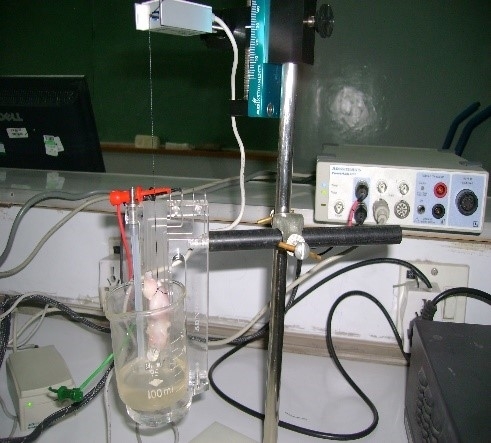Background: On exposure to prolonged cold temperature, the body responds for effective heat production both by shivering and nonshivering thermogenesis. Cold exposure increases the production of reactive oxygen species which influence the sarcoplasmic reticulum Ca++ release from the skeletal muscles and affect their contractile properties. The role of ascorbic acid supplementation on force of contraction during fatigue of cold exposed skeletal muscles was evaluated in this study. Method: It was a randomized control trial. Nine weeks old healthy, male Sprague-Dawley rats, weighing 200±25 grams were included in this study. Female rats were not selected as their monthly cyclical changes affect the stress induced. Diseased rats or those which developed any disease during the study period were excluded from the study. After taking recommendation from the ethical committee of Riphah University, Pakistan, 90 healthy, male Sprague Dawley rats were randomly divided into three groups of control (I), cold exposed (II) and cold exposed along with ascorbic acid supplementation (III). Group II was given cold exposure by keeping their cages in ice-filled tubes for 1hr/day for one month. Group III was also exposed to cold along with ascorbic acid supplement as 500mg/L mixed in drinking water for one month. After the study period, the rats were ether anesthetized in glass jars. The extensor digitorum longus muscle was dissected out and force of contraction during fatigue in the skeletal muscle fibers was analyzed on computerized data acquisition system.Graphical events as well as calculations were obtained with the help of Lab Tutor of Power Lab. Results: The cold exposed group showed a significant decline in the force of contraction during fatigue of skeletal muscle fibers as compared to the control group. The third group showed less fatigability and a better force of contraction than the cold exposed group. Conclusions: Ascorbic acid increases the resistance to fatigue in the muscles exposed to chronic cold. Key words Ascorbic acid, cold stress, fatigue, skeletal muscles
Future Physiology 2019 (Liverpool, UK) (2019) Proc Physiol Soc 45, PC29
Poster Communications: Effect of Ascorbic acid on fatigue of skeletal muscle fibers in long term cold exposed Sprague Dawley rats
A. Shahid1
1. Physiology, Hitec-IMS, Taxila Cantt, Taxila Cantt, Punjab, Pakistan.
View other abstracts by:
Extensor digitorum longus muscle on powerLab
Effect of Ascorbic acid on muscle fatigue<\#13>** P value < 0.01 is taken as highly significant
Where applicable, experiments conform with Society ethical requirements.


